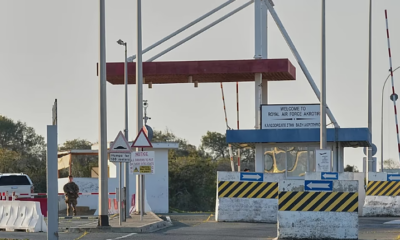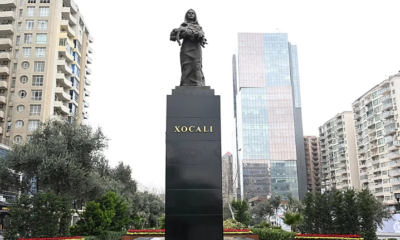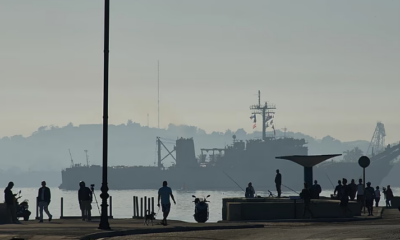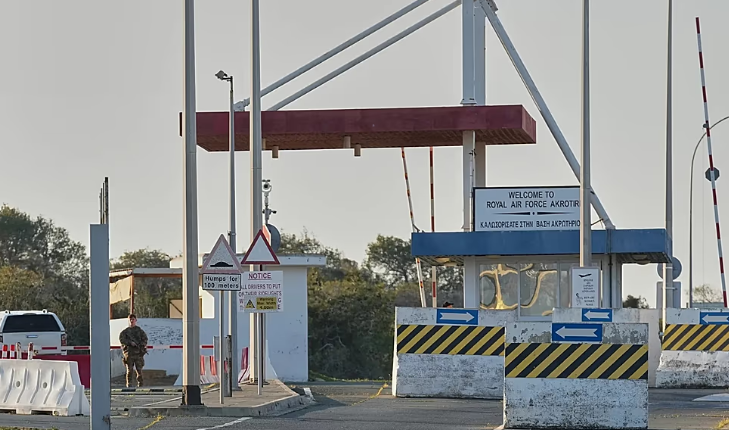News
Israel-Hamas Truce on the Brink as Humanitarian Aid Halted
A fragile ceasefire between Israel and Hamas is at risk of collapse after Israel blocked humanitarian aid into Gaza, following Hamas’ rejection of an Israeli proposal to extend the truce without committing to a full withdrawal of troops or a permanent end to the war.
Hamas has accused Israel of violating the agreement, calling the aid blockade “cheap blackmail” and a “war crime.” Meanwhile, international aid groups and the United Nations have condemned Israel’s decision, while Egypt, a key mediator, declared that it “unequivocally rejects the politicization of humanitarian aid.”
Hostage Negotiations Stall
According to Israeli authorities, 59 hostages remain in Gaza following the return of four bodies last week. Of these, 24 are believed to be alive. The delay in negotiating their release has added further tension to the truce discussions.
The United States has sent Middle East envoy Steve Witkoff to the region in an effort to either extend Phase I of the agreement or move to Phase II, which was meant to see the release of all living hostages and a total Israeli withdrawal from Gaza.
Breakdown of the Ceasefire Agreement
The ceasefire, initially implemented in three phases, has faced multiple setbacks.
- Phase I (January 19 – March 2): Hamas was expected to release 33 Israeli hostages in exchange for hundreds of Palestinian prisoners and increased humanitarian aid. Ultimately, 38 hostages were freed over 39 days, while Israel released 1,737 Palestinian prisoners. Israeli forces also withdrew to Gaza’s border regions, leaving urban centers and key corridors.
- Phase II (Scheduled for March 3): This phase was supposed to focus on negotiations for a permanent ceasefire, Israeli troop withdrawal, and the release of remaining hostages. However, talks have stalled, with both sides blaming each other.
On Friday, an Israeli delegation abruptly left Cairo, while a Hamas spokesperson claimed that no active negotiations were underway due to Israeli delays.
Israel’s Position
The Israeli government has proposed a 42-day extension of Phase I, allowing for the continued exchange of hostages and prisoners while keeping aid flowing into Gaza—but without committing to ending the war. Prime Minister Benjamin Netanyahu stated that the idea came from US envoy Witkoff, though Washington has yet to confirm this claim.
Israel says Hamas rejected the proposal, prompting Netanyahu to order a halt on all aid deliveries to Gaza.
Israeli PMO statement:
“In light of Hamas’ refusal to accept the Witkoff framework, Prime Minister Netanyahu has decided that as of this morning, all entry of goods and supplies into the Gaza Strip will be stopped.”
The statement also warned of further consequences if Hamas refuses to accept Israel’s terms.
Hamas’ Response
Hamas is insisting on proceeding with Phase II, which includes a full Israeli withdrawal and a permanent ceasefire. The group denounced Israel’s proposed extension of Phase I as an attempt to evade its commitments.
Hamas statement:
“This is a blatant attempt to avoid entering Phase II. The only way to secure the return of hostages is for Israel to uphold its commitments and begin negotiations immediately.”
Hamas has appealed to mediators such as Egypt and Qatar to put pressure on Israel to resume aid deliveries and adhere to the full terms of the agreement.
International Reactions
The United Nations, Egypt, and aid organizations have strongly criticized Israel’s move to block humanitarian aid.
- Egypt called on the international community to take action, saying Israel is using aid as a tool for political blackmail.
- Qatar stated that “food must not be used as a weapon” and condemned the suspension of aid.
- UN Humanitarian Chief Tom Fletcher warned that stopping aid deliveries violates international humanitarian law, urging that the ceasefire be maintained.
Meanwhile, White House officials have publicly backed Israel, with National Security Council spokesperson Brian Hughes saying that Israel has negotiated in good faith and blaming Hamas for derailing the process.
What’s Next?
With humanitarian aid suspended and hostage negotiations stalled, fears are growing that the ceasefire could collapse entirely. Far-right ministers in Netanyahu’s government are pressuring for a return to full-scale war, and analysts suggest that the new Trump administration may be less inclined to push for a peaceful resolution.
In a press release, the Hostages and Missing Families Forum called on President Trump to negotiate a comprehensive deal to bring all captives home in a single phase, stating that time is running out for those still held in Gaza.
Additionally, an Israeli source told CNN that Israel will not withdraw its forces from the Gaza-Egypt border, a condition that Hamas views as essential for Phase II to proceed.
As tensions escalate, Gaza’s population of over 2 million faces the risk of losing what little aid it had received. Doctors Without Borders (MSF) warned that even during the truce, aid restrictions have severely limited humanitarian relief efforts, with food and medical supplies still in short supply.
Over the weekend, Israeli airstrikes targeted northern and southern Gaza, with Palestinian health officials reporting at least four casualties. The Israel Defense Forces (IDF) stated that they fired at individuals attempting to plant explosives, further raising concerns about whether the ceasefire will hold.
For now, the truce remains fragile, with diplomatic efforts ongoing—but without significant progress, the region could see a return to full-scale conflict in the coming days.
News
Suspected Drone Strike Hits UK Base in Cyprus Amid Escalating Iran Conflict
News
Cruise Passengers Stranded Amid Escalating Middle East Crisis

The Persian Gulf is currently characterised by hostilities. The Strait of Hormuz is closed to shipping, with only vessels connected to China or Russia allowed to pass. The escalating crisis in the region has left thousands of tourists stranded on cruise ships and disrupted air travel.
On Sunday afternoon, a missile struck the water near the Mein Schiff 4, operated by TUI Cruises, while the ship was docked in Abu Dhabi, United Arab Emirates. Clouds of black smoke were reported over the water, according to the Bild newspaper. The vessel carries approximately 2,500 passengers and 1,000 crew members, with many due to return to Germany from Dubai. The situation on board is tense, and it is not yet clear if anyone was injured.
Security measures on the ship remain strict. Passengers are prohibited from entering outside decks, are advised to avoid windows, and receive regular alerts on their smartphones about potential incoming missile threats.
A sister ship, Mein Schiff 5, berthed in Doha, Qatar, is also affected. Passengers attempting to fly home from Doha on Saturday were forced to return to the ship after flights were canceled. Many had already boarded aircraft and had to leave luggage at the airport, waiting around ten hours before being taken back to the ship in the evening.
Other cruise lines are similarly affected. Six vessels are currently docked across ports in Dubai, Abu Dhabi, and Doha. These include the MSC Euribia from MSC Cruises, the Celestyal Discovery and Celestyal Journey from Celestyal Cruises, and the Aroya from the Saudi operator Aroya Cruises.
The closure of airspace in multiple countries in the region has compounded the situation, preventing passengers from flying home. Thousands remain stranded, unsure when they will be able to continue their journeys or be evacuated safely.
The crisis follows US and Israeli strikes in the region on Saturday, which prompted retaliatory attacks by Iran targeting military positions in the Persian Gulf. Cruise passengers, many of whom expected a calm holiday, have instead faced a sudden escalation in regional tensions.
Authorities in ports and embassies are coordinating with shipping companies to maintain safety and provide updates, but the rapidly evolving security situation has made evacuation and travel plans uncertain. Tourists are advised to follow official guidance and avoid unnecessary movement on or around their vessels.
The disruption highlights the wider impact of escalating hostilities in the Gulf, affecting not only commercial shipping but also tourism and international travel. Passengers on affected cruise ships and flights face prolonged delays as authorities work to stabilize the situation and ensure safety in the region.
News
Azerbaijan Commemorates Khojaly Massacre with New Memorial and National Ceremony
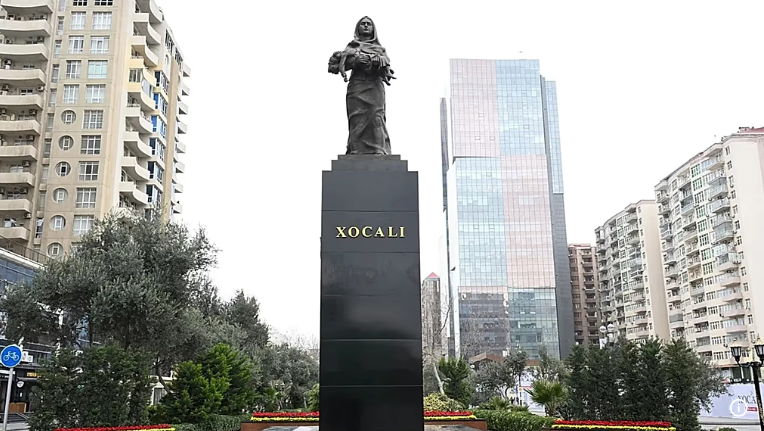
Azerbaijan held nationwide commemorations on Thursday to mourn the hundreds of civilians killed in February 1992 in the town of Khojaly during the Karabakh conflict with Armenia. President Ilham Aliyev led the ceremonies, inaugurating a new Khojaly Genocide Memorial Complex in Baku to honor the victims of what he described as “the greatest tragedy for the Azerbaijani people.”
Thousands of people gathered at the Khojaly Massacre Memorial in Baku for the National Day of Remembrance. A minute of silence was observed across the country as citizens paid tribute to those who lost their lives over 30 years ago.
Azerbaijani authorities state that 613 civilians, including women and children, were killed when Armenian forces, with the support of the former Soviet Union’s 366th Guards Motor Rifle Regiment, attacked Khojaly. Dozens more were reported missing or injured during the assault, which occurred amid the war between ethnic Armenian forces backed by Armenia and Azerbaijani troops over the Karabakh region and surrounding areas.
Human Rights Watch conducted its own investigation into the incident, attributing direct responsibility for the civilian deaths to Karabakh Armenian forces. Armenia has repeatedly denied the accusations, arguing that the reported death toll was exaggerated and that casualties resulted from fighting between the two sides.
Despite differing accounts, the Khojaly tragedy remains a deeply significant event in Azerbaijan’s collective memory. Commemorations continue to emphasize the human cost of the conflict and the impact on generations of Azerbaijanis.
This year’s ceremonies took place against the backdrop of a peace and reconciliation process between Azerbaijan and Armenia. Both nations have pledged to work toward a more stable and peaceful future following decades of conflict and suffering on both sides.
President Aliyev emphasized the importance of remembering the past while looking forward. The newly inaugurated memorial complex aims to provide a permanent site for reflection, ensuring that the victims of Khojaly are remembered by future generations.
The National Day of Remembrance has become a focal point for public reflection and national unity, drawing participants from across Azerbaijan. Observers note that the ceremonies serve both to honor the victims and to reinforce awareness of the historical and ongoing challenges in the Karabakh region.
Over 30 years after the massacre, Khojaly continues to hold a central place in Azerbaijani history. Thursday’s events highlighted the nation’s efforts to commemorate the past while supporting dialogue and cooperation with Armenia to foster lasting peace in the South Caucasus.
-

 Entertainment2 years ago
Entertainment2 years agoMeta Acquires Tilda Swinton VR Doc ‘Impulse: Playing With Reality’
-

 Business2 years ago
Business2 years agoSaudi Arabia’s Model for Sustainable Aviation Practices
-

 Business2 years ago
Business2 years agoRecent Developments in Small Business Taxes
-

 Home Improvement1 year ago
Home Improvement1 year agoEffective Drain Cleaning: A Key to a Healthy Plumbing System
-

 Politics2 years ago
Politics2 years agoWho was Ebrahim Raisi and his status in Iranian Politics?
-

 Business2 years ago
Business2 years agoCarrectly: Revolutionizing Car Care in Chicago
-

 Sports2 years ago
Sports2 years agoKeely Hodgkinson Wins Britain’s First Athletics Gold at Paris Olympics in 800m
-

 Business2 years ago
Business2 years agoSaudi Arabia: Foreign Direct Investment Rises by 5.6% in Q1

